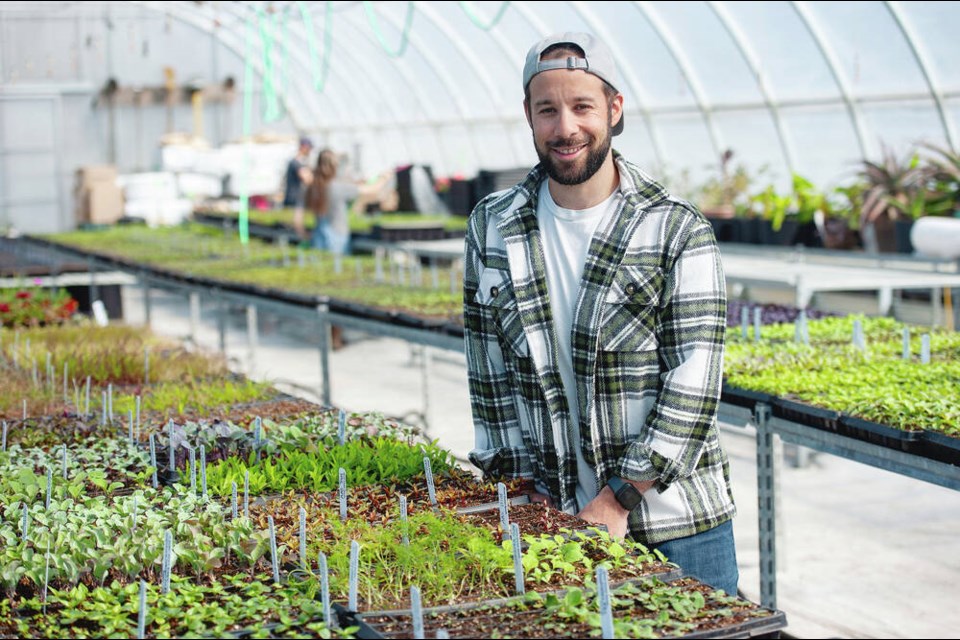VANCOUVER — Aaron Saks once tried to count the number of seeds sent each spring from the West Coast Seeds’ warehouse in Delta to gardeners and garden stores across Canada.
He gave up somewhere in the millions.
With 1,100 varieties for sale — from ever-popular rainbow carrots to tricky-to-grow Himalayan blue poppies — the B.C.-based seed company saw demand surge during COVID-19 and remain strong amid rising food prices.
A 2020 study from the Agri-Food Analytics Lab at Dalhousie University in Halifax found that 51 per cent of Canadians grow at least one variety of fruit or vegetable in a garden — with 17.4 per cent starting their garden during the pandemic. In B.C., more people now grow some food than those who don’t grow any.
Saks, president of West Coast Seeds, said the sudden increase in demand during the lockdown led to a backlog that took several months to clear. But B.C.’s newest green thumbs have proven faithful as the pandemic waned, with many continuing to seek seeds to grow their own food and live more sustainably.
The rising cost of food may also play a role. The Dalhousie study found 85 per cent of gardeners were concerned food prices would rise.
“Results show many Canadians remain quite anxious and really wanted to take control of their own food supply chain during a time of great uncertainty,” Sylvain Charlebois, director of the Dalhousie food lab, said at the time.
Saks said he views seeds as eventual food — and a way to help “repair” the earth.
“All our seeds are non-GMO,” he said on a recent tour of the company’s Delta test gardens.
What appears to be a lush, green lawn at the front of the property is actually test strips of “bee turf,” alternatives to traditional lawn grass that require less water and attract pollinators. Nearby, rectangular garden beds contain test plantings of various vegetables and flowers in conditions similar to the average home garden, while a greenhouse is filled with trays of tiny seedlings.
“All our seeds are tested to make sure they’re appropriate for our climate,” said Saks.
The West Coast Seeds catalogue, which typically comes out in early December, is like Christmas come early for many B.C. gardeners, allowing them to plan their gardens while snow is still on the ground. Mail orders are shipped across Canada, although the company’s “bread and butter” comes from B.C. gardeners.
The arrival of spring heralds the beginning of busy season at the West Coast Seeds’ warehouse, with millions of seed packets filled both by machine and by hand and distributed to garden stores.
Saks said West Coast Seeds purchases its seeds from around the world. Most are imported from the U.S., where warmer weather provides better conditions for harvesting.
None of the company’s seeds are genetically modified, with a sizable portion of them designated as organic.
“All of our seeds can be grown organically,” Saks said.
West Coast Seeds was started in Vancouver in 1983 — 40 years ago — by Mary Ballon, an organic gardener before the term “organic” was popular. The company has switched hands a few times since then, but remains true to its founder’s vision, providing education and support to gardeners new and experienced.
A service team answers calls and emails about soil, water, heat, light and all things related to growing.
The backs of West Coast Seeds packets also provide detailed descriptions, including not only how and when to plant seeds, but how to care for and harvest the vegetables, fruit and flowers.
Saks said ecommerce data shows many people visit the company’s website simply to learn about seeds. And while that doesn’t benefit online sales, it furthers connects West Coast Seeds to the community.
Seeds that don’t sell are donated to schools, seed libraries, community gardens and overseas aid projects.
“If I hear about a seed donation that doesn’t involve us, I feel a little annoyed,” said Saks. “It should be us.”
The company recently donated seeds to Kwantlen Polytechnic University’s seed library, which needed to be rejuvenated after several slow years through the pandemic. The library allows students to “borrow” seeds of some of their favourite vegetables in return for an equivalent amount of seeds after harvest. The library provides instructions on how to harvest them.
“We know that food insecurity among post-secondary students is a serious issue, and the seed library might be one very small way in which we can help students ease their grocery bills,” said Kwantlen librarian Celia Brinkerhoff, who established the seed library with horticulture students and instructors 10 years ago.
“All it takes is access to a few containers, a small space, a balcony,” she said. “Beyond growing food for ourselves, a seed library also encourages people to think about our current food system and its connection to climate change.”
In a way, many gardeners are activists, interested in sustainability and taking care of the earth, said Saks.
As B.C. has experienced drier summers in recent years, West Coast Seeds has been working to source seeds that don’t use as much water and that attract pollinators, like bees.
The company is educating gardeners about the value of cover crops in winter to increase soil health. And there’s also a recent push toward growing year-round, with crops that are planted in the fall, like garlic, and others that can be grown indoors under lights, like microgreens.
“Anybody can garden,” said Saks. “It really starts with planting a seed.”



